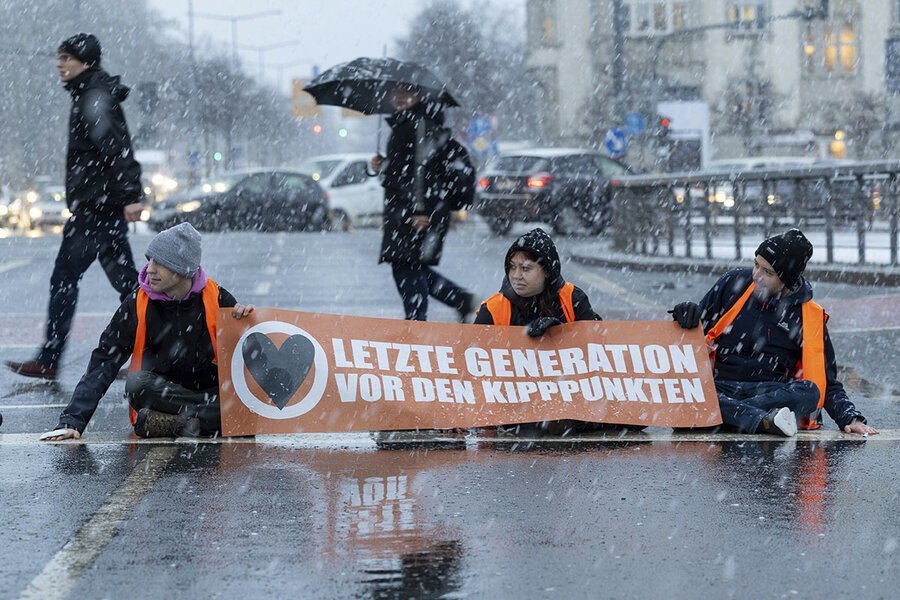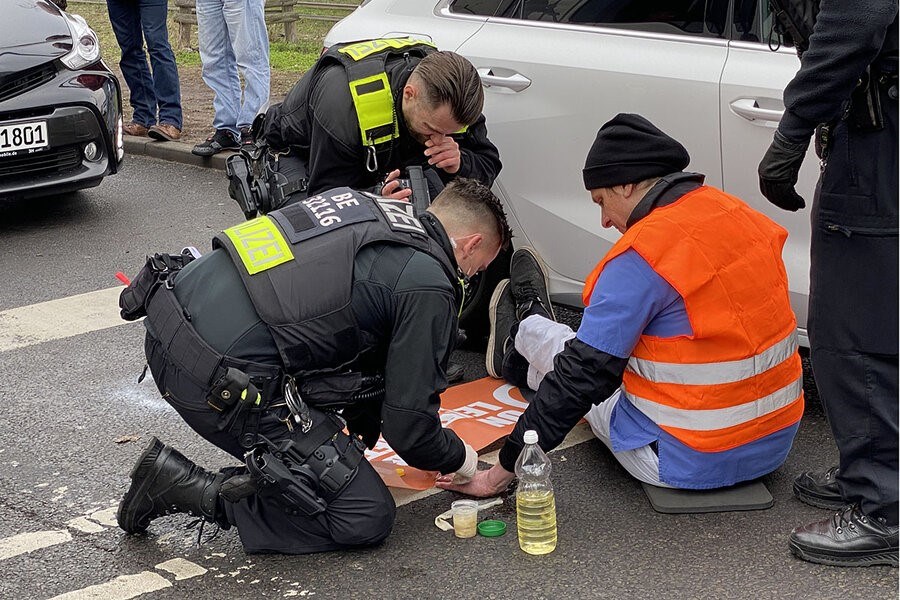REPRINTED WITH PERMISSION FROM THE CHRISTIAN SCIENCE MONITOR
 Members of the Last Generation activist group glue themselves to a street during snowfall in Dresden, Germany, to draw attention to the need to achieve compliance with climate targets, Jan. 20, 2023. Daniel Schaefer/dpa/AP
Members of the Last Generation activist group glue themselves to a street during snowfall in Dresden, Germany, to draw attention to the need to achieve compliance with climate targets, Jan. 20, 2023. Daniel Schaefer/dpa/AP
March 3, 2023
For members of German-Austrian climate activist group Last Generation, the stakes could not be higher.
“It’s the climate crisis that is hurting people, that’s endangering lives,” says member and university student Zoe Rüge. She’s shocked by society’s blasé attitude toward climate change, and says leaders have two to three years before certain tipping points make it impossible to meet the 1.5-degree Celsius global warming limit set by the Paris agreement.
To draw society’s attention to the issue, the group has staged disruptive protests, usually by gluing themselves to roads and tarmacs. In October, members halted traffic on a major Berlin highway, which ended up blocking a rescue vehicle whose patient later died. In November, they paralyzed operations at Berlin’s airport, diverting more than a dozen flights and affecting nearly 4,000 passengers.
Politicians and citizens alike have called out Last Generation for being irritating, reckless, or even criminal. In one survey, 86% of German respondents said the group’s actions are hurting the climate cause.
But are they really ineffective? Their tactics may not be earning public plaudits, but Last Generation is drawing on a tradition that has been used for moral crusades past – including ones remembered favorably today, like the campaign to earn women the right to vote in Britain, which was waged, often violently, by the suffragettes. And climate activists like Lost Generation are willing to use a similar strategy today.
“[Suffragettes] were also treated very harshly, and they also heard arguments that it isn’t democratic what they’re doing – that no one ‘voted’ for the right to vote,” says Ms. Rüge. “But they started the change. I can vote in a few weeks in Germany.”
“History shows that civil disobedience can work, although it’s unpopular. Whether this [climate activism] will work, no one knows,” says Reinhard Steurer, a professor of climate politics at Vienna’s University of Natural Resources and Life Sciences. “We don’t have the mass protests anymore, because society is fed up with the climate crisis and wants to be left alone. So you can either put your head into the sand, or try other things, and that’s what these small groups are doing. They’re trying to wake up society.”
 Lenora ChuA Last Generation protestor is surrounded by police in a busy Berlin intersection where he's glued his hand to the pavement, Feb. 10, 2023.
Lenora ChuA Last Generation protestor is surrounded by police in a busy Berlin intersection where he's glued his hand to the pavement, Feb. 10, 2023.
Deeds, not words
It’s been about a century since women earned the right to vote in the United Kingdom.
In pursuit of that right, the suffragettes, mostly middle-class women, went on hunger strikes, broke windows, and chained themselves to public property. They used pipe, fire, and letter bombs to attack train stations and churches, and even attempted an assassination of a magistrate. One suffragette famously slashed Velasquez’s Rokeby Venus painting as it hung in London’s National Gallery, and another died after running onto a derby racetrack and colliding with a horse.
The suffragettes largely committed to harming property, not people, though their tactics grew more violent as time wore on, leading to fractures over approach. Some women preferred peaceful methods, while others such as suffrage leader Emmeline Pankhurst grew increasingly militant with their famous “deeds, not words” approach, says Maria DiCenzo, a professor of feminist media at Wilfrid Laurier University.
“There was an escalation with the increasing frustration when it became clear parliamentary bills were set up with no intention of passing them,” says Dr. DiCenzo. “In spirit [the climate movement] has been very similar. You know, we’re tired of talking, tired of lobbying. We have to be much more disruptive in order to get attention. ‘Better broken windows than broken promises.’”
Today’s climate activists insist on nonviolence, though they are coming into increasing conflict with state authorities. Ultimately their success will depend on their public resonance, says Dr. DiCenzo.
“Whatever tactics a social movement engages in, they do have to communicate in order to be effective,” she says. “Alienating and angering people who might, in fact, be sympathetic in other ways, is counterproductive. That certainly was the case historically.”
 Lenora ChuPolice attempt to remove the protestor's hand from the pavement in Berlin, Feb. 10, 2023.
Lenora ChuPolice attempt to remove the protestor's hand from the pavement in Berlin, Feb. 10, 2023.
Analysts note that some climate activists’ actions seem to have little to do with their goals, which can confuse the public. When Last Generation wanted a law to minimize food waste, they blocked roads. “If you’re a driver going to work, it’s not clear what this has to do with the wasting of food,” says Dieter Rucht, a social movements scholar at the Social Science Research Center in Berlin.
The Last Generation’s proposals are also relatively naive, says Dr. Rucht. One asks the government to execute environmental action plans of a council of citizens chosen by lottery, essentially requiring politicians to commit to such plans before they even know what they are. “In my view, this is not compatible with the conventional understanding of democracy based on formal voting and broad participation.”
Does disruption effect change?
Historians today debate the suffragettes’ contribution to getting women the vote. Did their violent disruptions lead to voting rights, or did they delay something that was inevitable? After all, women earned full voting rights in 1928 in the U.K., around the same time as women in other countries including Holland, Germany, and Austria.
“Was the vote granted as a reward for the women’s [World War I] effort?” says Dr. DiCenzo, referring to the suffragettes’ shift in tactics during the war from disobedience to supporting the war effort. For her part, Dr. DiCenzo thinks suffragettes did help bring about the granting of partial voting rights in 1918. “Historians deal with this question all the time. It’s impossible to ever resolve that question because the factors were so complex.”
The climate activists’ effect on society is no less difficult to determine, especially because the various groups continue to evolve. The U.K.-based Extinction Rebellion is trying to reach broader swaths of society, and in January declared they’d stop their radical acts of disobedience, which at one point included camps of mass protest at a number of major London intersections, ultimately costing the metropolitan police tens of millions of pounds.
 Letzte Generation Oesterreich/ReutersGustav Klimt's painting "Tod und Leben" is seen after activists of Last Generation Austria threw oil at it in the Leopold Museum in Vienna, Nov. 15, 2022.
Letzte Generation Oesterreich/ReutersGustav Klimt's painting "Tod und Leben" is seen after activists of Last Generation Austria threw oil at it in the Leopold Museum in Vienna, Nov. 15, 2022.
Meanwhile, other groups promised to move from civil disobedience into more militant “civil resistance.” The U.K.-based Just Stop Oil, known for throwing tomato soup on Van Gogh’s “Sunflowers” at the National Gallery, promised to ramp up their actions. They’ve disrupted operations at oil terminals in the name of stopping fossil fuel production, and proudly claimed its supporters have been arrested roughly 2,000 times.
And some could radicalize further, Dr. Rucht warns, as the public becomes increasingly turned off by their tactics. He has already noticed small violations of the “golden rules” of civil disobedience. “One of those rules is you present your identity,” he says. “You don’t hide: ‘This is my name, this is my face, and this is why I’m here.’ But some cover their faces and put glue on fingertips to hide identities.”
“One trend is a radicalization of certain groups,” he says. “It’s a very heterogeneous movement. You cannot rule out what people – including crazy people – might do one or two years from now.”
But for those who support the activists’ desire to publicize the threat of climate change, a certain amount of disruption is to be expected.
“Of course people get mad at them, of course they disrupt, they anger,” says Helga Kromp-Kolb, a meteorology professor at Vienna’s University of Natural Resources and Life Sciences. “But that’s how you start a movement in society. We scientists have been trying to do this for 30 years, telling people that we must do something about climate change. It hasn’t had any real effect.”
Related stories
Page created on 3/8/2023 10:29:38 AM
Last edited 3/8/2023 10:40:56 AM
